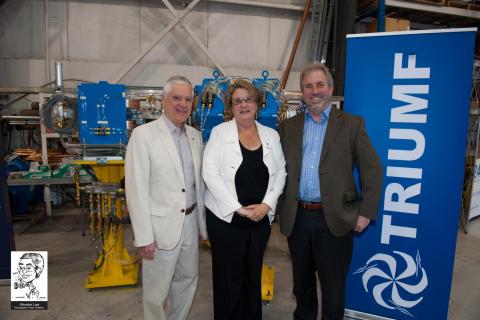
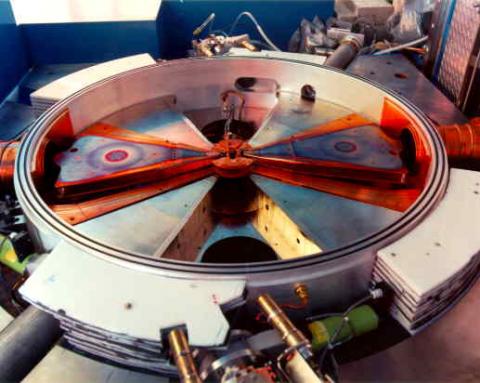
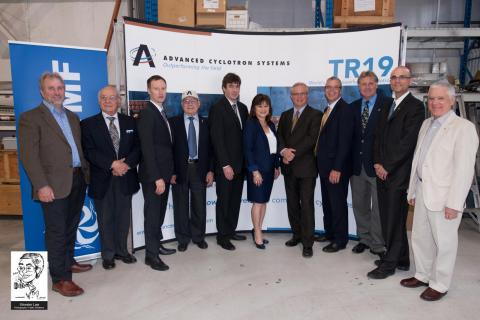
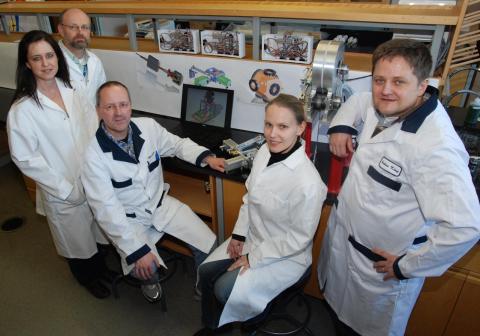
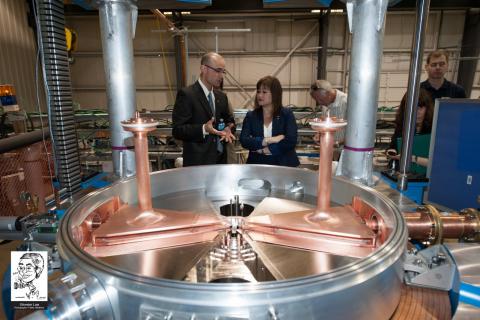
Canadian Solution to Medical-Isotope Crisis Demonstrates that Cities Could Produce their own Medical Isotopes
VANCOUVER, June 9, 2013 --- At a press conference organized at nearby Advanced Cyclotron Systems, Inc., TRIUMF announced new progress in the quest to develop and deploy cyclotron production of Tc-99m. For details see TRIUMF's Medical Isotopes microsite.
With Canadian-developed tools and technology, a national team led by TRIUMF has reached a crucial milestone at the BC Cancer Agency in developing and deploying alternatives for supplying key medical isotopes. The team used a medical cyclotron that was designed and manufactured by Advanced Cyclotron Systems, Inc. (ACSI) of Richmond, BC, and successfully achieved large-scale production of technetium-99m (Tc-99m), sufficient for a metropolitan area.
The team announced the successful ramp-up of its technology to regularly produce enough of the critical Tc-99m isotope to supply an urban area the size of Vancouver. This achievement eliminates the need for nuclear reactors to produce isotopes, especially those that use weapons-grade uranium, which has been the traditional approach.
Paul Schaffer, head of TRIUMF's Nuclear Medicine Division and principal investigator for the project, said, "This achievement is a crucial step on the road to meeting Canada's isotope needs after the NRU ceases production in 2016. This effort required teamwork and dedication from many people." In addition to TRIUMF, Canada's national laboratory for particle and nuclear physics, the team includes experts at the BC Cancer Agency, the Centre for Probe Development and Commercialization (CPDC), and Lawson Health Research Institute.
Each year, tens of millions of medical procedures are conducted around the world with Tc-99m, an isotope used in radiopharmaceuticals for imaging disease in the heart, bones, and elsewhere in the body. A small number of ageing reactors account for most of the global capacity for isotope production; one of them is the AECL National Research Universal (NRU) reactor in Chalk River, Ontario. In the past few years, these reactors have suffered maintenance and repair outages, threatening the global supply of medical isotopes.
"Today's milestone demonstrates the positive, tangible results being achieved by our government's investments in jobs and science," said Wai Young Member of Parliament for Vancouver South, on behalf of Canada's Natural Resources Minister, Joe Oliver. "Our contributions are supporting jobs and helping advance new technologies for the production of the key medical isotope, Tc-99m."
"The BC Cancer Agency is very proud of our team's time, effort, and use of specialized research expertise to make it possible to produce large quantities of Tc-99m with medical-cyclotron technology," said Dr. Max Coppes, president of the BC Cancer Agency. "This work is a great example of the innovation that can be created through multidisciplinary research and partnerships."
Richard Eppich, CEO and President of ACSI, noted, "We are proud of the TRIUMF team and of our equipment; this demonstration validates the overall approach that Canada has been championing—that modern, high-power cyclotrons can produce all of the essential medical isotopes needed in the best hospitals and clinics."
"The approach taken by our consortium has established the feasibility of producing appreciable quantities of Tc-99m on Canada's existing cyclotron network. These same machines are also producing additional isotopes used in a growing number of alternative imaging procedures. The net effect is that Canada will remain on the forefront of medical-isotope technology for the foreseeable future," said John Valliant, Scientific Director and CEO of the CPDC in Hamilton.
In February 2012, the TRIUMF-led team demonstrated that the production of Tc-99m was possible on existing medical cyclotrons based in BC and Ontario. After a year of scaling up performance and making engineering improvements to target fabrication, control, and purification procedures, the team has achieved its next milestone: the production of enough Tc-99m in a six-hour overnight shift at the BC Cancer Agency Vancouver Centre to supply the demands of a metropolitan area (roughly equivalent to 10 Curies). The next milestones for TRIUMF and its partners include engineering optimization and regulatory approval.
Michael Kovacs, imaging scientist at Lawson Health Research Institute said, "This milestone is key to our plans to deploy this technology to the existing medical cyclotron facilities in Canada, and hundreds more worldwide. The diversification of the Tc-99m supply chain with robust and cost-effective cyclotron-based technology will reduce the dependence on the conventional, reactor-derived supply."
Commenting on the path forward, TRIUMF's director Nigel Lockyer said, "Having cleared this technical hurdle, we are well on our way to assembling the right team to make a competitive proposal to join the BC supply chain for medical isotopes such as technetium-99m. I look forward to working with existing and new partners, including ACSI, in making this possible."
The recent breakthroughs have been supported by the Isotope Technology Acceleration Program (ITAP) of Natural Resources Canada. Initial research on cyclotron production of Tc-99m was supported by Canada's National Sciences and Engineering Research Council and the Canadian Institutes for Health Research through a research grant awarded to the University of British Columbia to support a team led by Dr. François Bénard and Dr. Thomas J. Ruth, from the BC Cancer Agency and TRIUMF, respectively.
--based on a TRIUMF press release
